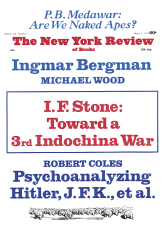In response to:
The Liberals and German History: Part II from the November 2, 1972 issue
To the Editors:
Geoffrey Barraclough makes the factual interpretation of the Reichstag fire an important pivot in his argument against the ideological view of “historians of the older generation,” and he refers to Fritz Tobias (1964) as the last word on the reality of a Nazi plot (NYR, November 2).
I have a newspaper clipping from 1969 stating the conclusions of a “Committee for Scientific Research into the Origins and Consequences of World War II” which included André Malraux and Willy Brandt among its members. According to this committee, one SS trooper who helped set the fires was still living and had been interviewed. The committee dismissed Tobias’s book as being based on testimony of questionable (Nazi) police investigators.
Mr. Barraclough has not been so kind; he has not told us why he does not believe the later study. Perhaps the newspaper report errs? Whether Goebbels or van der Lubbe struck that match is an important point indeed.
Charles T. Hoard
Stanford University
Stanford, California
Geoffrey Barraclough replies:
I am delighted that Professor Pachter agrees that “the Nazis did cause some major structural changes in German society” and that historians have the right to study these changes and “to ‘de-demonize without being accused of exculpating Hitler.” These were two of the main points I wished to establish. For the rest, if Professor Pachter finds my arguments “be-wildering,” I am frankly baffled by his. I thought I had defined fairly precisely what seem to me to be the essential features of German liberal historiography, and where “post-liberals” differ. Can it be that he confuses “post-liberal” with “anti-liberal,” or even imagines that “post-liberal” means dreary, out-dated Stalinist orthodoxy? When he writes of “liberal and illiberal enemies of the Nazi regime,” drags in Willi Muenzenberg, the ingenious communist fabricator of the Reichstag fire myth (an admirable propagandist, incidentally, with a salutary disrespect for historical truth), the “theory of Leninism,” and Bert Brecht, it seems suspiciously likely. If so, I can only say that the sooner we transcend the liberal and communist clichés (Nazism as “the ultimate form of capitalism,” for example) that have bedeviled German history, the better.
It is, no doubt, true (others have written to me and pointed it out) that in certain instances “the opening of archives” has facilitated (or even necessitated) revision. Far more important, I still believe, is the change in historical perspective arising from the passage of time, a lengthened view, different circumstances, and the rise of a new generation. Professor Pachter notwithstanding, I have never suggested (I am not quite so naïve) that Nazism was nothing more than a “particularly virulent form of German nationalism”; but it is simply a statement of fact that—like it or not—it does have “its place in the stream of German history,” and we are not going to get much further in understanding modern Germany so long as we write it off as merely a “tragic aberration.” Far from trying to “wipe out the Nazi period,” my whole endeavor was to put it into perspective, and particularly to distinguish it from the preceding period of right-wing nationalism with which he accuses me of confusing it.
Much of what Professor Pachter attributes to me is so remote from anything I wrote or think that I am happy to leave it to the reader to judge how far it is relevant. But I am astounded to learn that I “minimize the impact” of “Bismarck’s violent and contra-revolutionary solution of the German question.” I was afraid that, if anything, I should be accused of insisting too much on the dire consequences of Bismarck’s policies, and of tracing continuities from Bismarck’s time to 1934, that did not exist. Here, at least, Professor Pachter and I see eye to eye, even if he refuses to recognize the fact. All I will add is that the tragedy of Germany was that the liberals, who might have turned the balance, succumbed to the Bismarckian solution, convincing themselves (as Professor Pachter apparently is still convinced) that there were no alternatives to the policies they followed with such disastrous consequences from 1918 to 1930. There were; but that is another question, which would require another long essay.
As for Mr. Hoard’s letter, I confess to ignorance. I had not seen the cutting to which he refers. But surely he is not so naïve as to suppose that a statement by one SS man clinches the matter? It is one more piece of testimony by another Nazi or ex-Nazi, no more reliable than the rest (perhaps no less so) and requires processing, as the evidence collected by Tobias requires processing. This is what Mommsen did, to my mind convincingly. Has Mr. Hoard troubled to read Mommsen, and if so, what precisely does he find questionable?
This Issue
March 8, 1973



